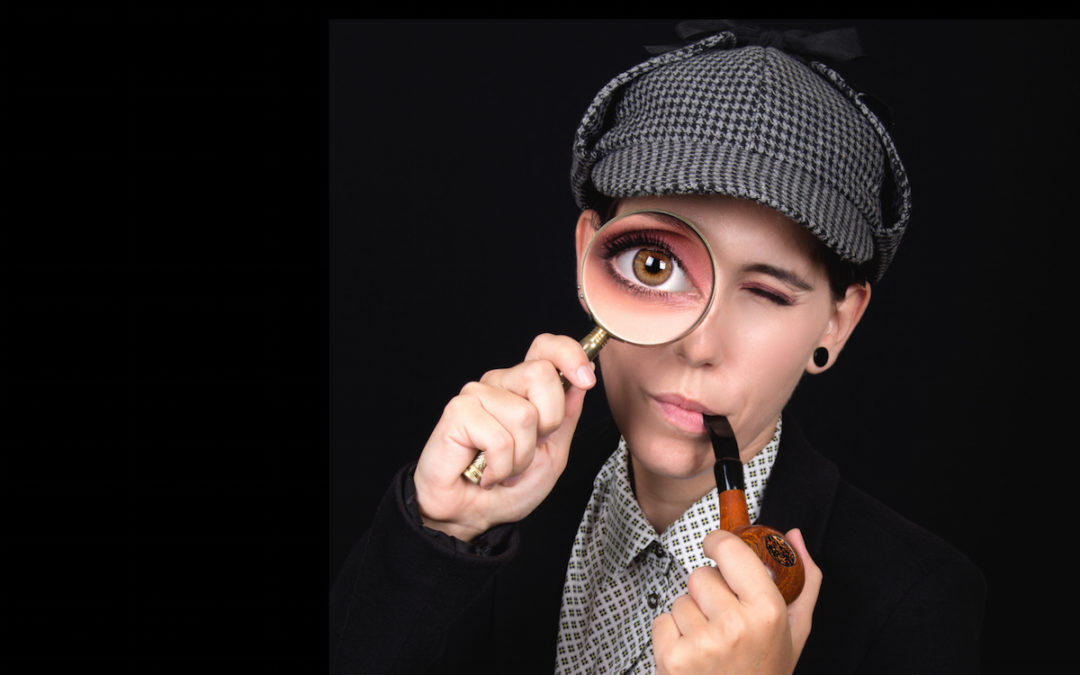
5 Ways To Become More Sherlock Holmes
Every image you see of Sherlock Holmes is of him with his hat, his pipe and with his magnifying glass in his hand. And when you’re struggling to see something, the natural response is to lean in, to peer more closely in the hope that suddenly by reducing the distance, you will increase the vision. And for tiny writing on a label on the back of a jar, or for the fine print on a document, this can work perfectly.
But if you’ve ever read a Sherlock Holmes book, seen a movie or watched a television series, the characters are always astonished by what he notices. They are bewildered, puzzled and often a little frightened by how accurately he sees them, even at first meeting.
Does he use his magnifying glass for this?
No. In essence he uses his peripheral vision, his wider view to capture information that most people miss. And it’s this information that truly gives him the answers he seeks.
Let’s talk about peripheral vision for a second.

When we look at this image which demonstrates peripheral vision, we can see clearly how wide the angle of vision is for most people. Although you might be looking at a specific point straight in front of you, your brain is taking in a lot of ‘peripheral’ information around the edges at the same time.
When you want to focus in on one aspect of what you’re seeing and block out everything else, it makes sense to come closer. But if you went around the world, trying to peer at everything by excluding your wider vision, what would happen? You’d fall over. Of course you would. You wouldn’t be able to find your balance or see where you were going!
It’s the same with difficulties in life. When we ‘zoom in’ and focus on the problem, we can’t see anything else. I don’t know about you, but in my experience, the closer I get, the more I scrutinise, analyse or immerse myself in the problem the more it continues to look exactly the same. In fact, it’s easy for my vision to blur to such an extent that I can’t see at all.
Think of a camera. We all have one built into our phone and we’re constantly using it to capture images of our lives and the things we experience around us. Sometimes we need to zoom in to see the detail we want to capture but in order to create context in our photos we need to keep a wide angle view. There’s no point in having endless selfies with no understanding of where we are, what we’re doing or why we’re taking the picture. It’s the scenery, the wider view that helps us create memories of the experiences we want to capture.
From close up, it’s impossible to find solutions, find answers, find balance or see the path ahead.
We need to stand up and take a wider view in order to truly see what’s in front of us. We need to add some context and some perspective.
So what can you add to the picture to make sense of what you’re seeing?
Acknowledge your emotions
Emotions are the way we become alert to what we’re thinking and what is going on in our body. They are an information signal but if you don’t acknowledge them, drown in them or try to push them away then their purpose is lost. Accepting your emotions allows them to pass through you instead of settling in your heart, your mind and your body. It’s easy to get stuck in our feelings and not see the truth of what they’re here to show us.
Give yourself some space
Go for a walk, go to a movie, distract yourself by being with others or take some time to do something you enjoy. When you put yourself in a difference space you also put yourself into a different state. And that different state can give you a chance to connect with the steady part of yourself that knows no fear, that knows the answers and can give you the strength to go on.
Add gratitude to the mix
When life feels hard, it can seem almost impossible to connect with being thankful. But when you truly look to see the wonderful things that surround you, even if all you can see is the four walls you live in, you shift your vision from what is difficult to the good things you already have. Even if you are in loss, you can lift your head and be thankful for the person, the experience or the joy you felt before things changed.
Slot this experience into the timeline of your life
Although this is an issue for you now, and it might be for some time, in the scheme of your entire life it is only a moment. A big moment, perhaps a life changing moment, but simply a moment. Think about whether you will feel this way in six months, a year, five years.
Focus on your options
Sometimes we just need to get out of our emotions and into our head. Not to stay there, but as a way of adding some further information. This can be a powerful way to help diffuse sadness, worry or uncertainty. Write a list of five things you have a choice about.
What are my options?
What can I do?
What would make a difference?
How will I feel if?
How will this take me where I want to go?
Sometimes the simple act of making a decision, even if you change it later, helps relieve the emotional charge around what you’re experiencing.
Sherlock Holmes is the masterful detective he is not because he narrows his focus but because he widens it.
He widens it to include everything no matter how seemingly irrelevant. Only when he has the full picture does he see clearly.
It’s the same in life.
Peripheral vision brings knowledge, balance, perspective and clarity.
Don’t become Sherlock Holmes with a magnifying glass.
Become Sherlock Holmes with a wide angle lens taking in everything around him.
Step back to add some context, to add some perspective and to add some balance.
I promise you will see things more clearly than ever before and the answers you seek will find you.
You can use Sherlock Holmes’s skills of observation and awareness to help you make desicision, guide your choices and improve your relationships with others.
Watch my livestream video on this topic to learn more about how to use your peripheral vision to guide your life






